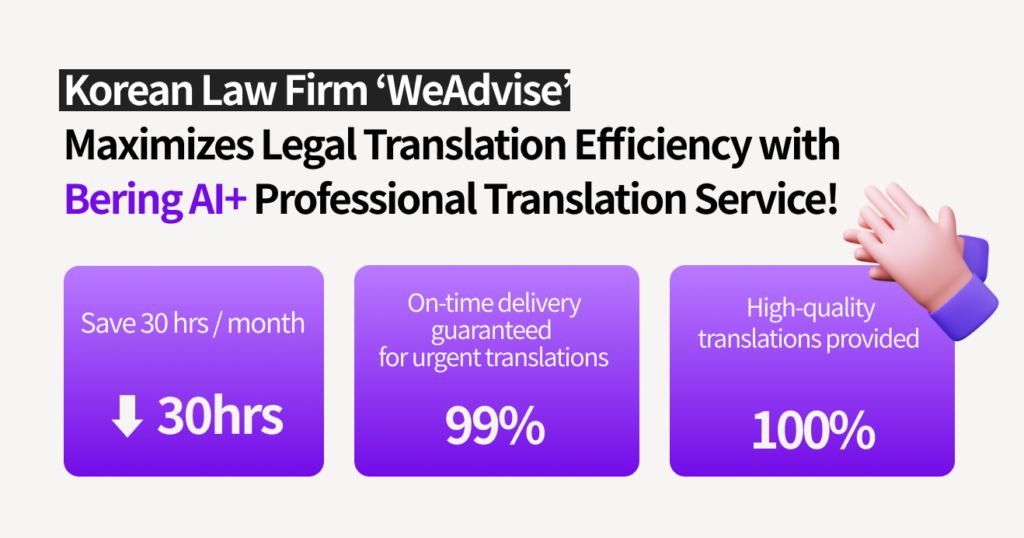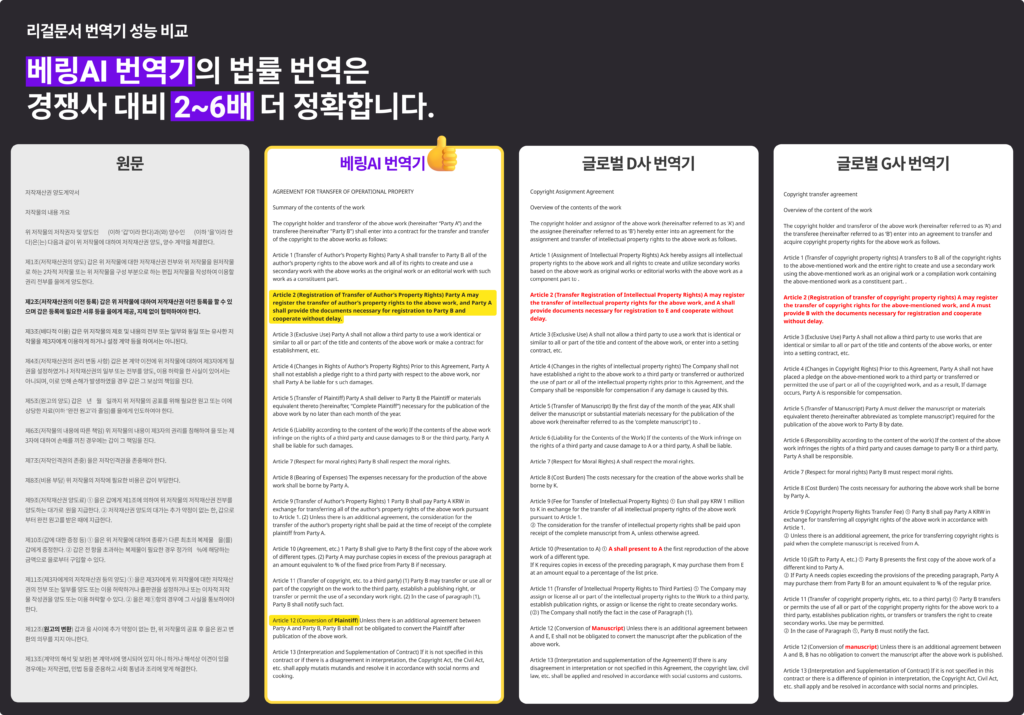“Even competitors acknowledge that if someone has worked with ‘BeringLab,’
their skills have been validated.”
– Interview with JH Lee,
a former attorney who studied law in both Korea and the USA –
Today, we introduce JH Lee, a translation expert who majored in law in Korea and the USA and has worked as both a lawyer and a lecturer. Having studied and worked in the legal field in both Korea and the USA, JH Lee possesses profound expertise and proficiency as a specialized legal translator. Let’s delve into the story of JH Lee, a professional translator at BeringLab. 😊
Q. Before you started as a professional translator, what were your major and experiences?
A. I completed my studies at Georgetown Law School in the USA, and later, I earned a Ph.D. in International Law from Ewha Womans University in Korea. I worked as a researcher and lecturer at Ewha Womans University and then as a foreign attorney in a domestic law firm. I have handled a lot of business document translations for major Korean corporations like Samsung Electronics, KakaoPay, and Shinhan Bank. My major in International Law led me to author the manuscript for a complete series of YouTube content on ‘Biodiversity’ under international law for the National Institute of Biological Resources.
Q. How did you begin your career as a professional translator?
A. As I often dealt with foreign clients, I naturally performed tasks similar to translation even before becoming a professional translator, researching and translating legal documents and cases for English-speaking countries. Thanks to these experiences, I have been working as a professional translator since 2018.
Q. What types of translation work do you mainly handle?
A. Linked to my background, I primarily work on ‘legal translations,’ including translating contracts and tender proposals. Since business documents often contain technical and legal content, I also handle business projects. Additionally, I collaborate on a variety of documents related to power plants, medicine, patents, real estate, and even marketing slogans for law firms. Although I mainly work on Korean to English translations, I also frequently handle English to Korean documents.

Q. How did you initially join BeringLab as an affiliated translator?
A. During my time at a law firm when it was still called IvyForce (now BeringLab), Our company was a client. Trusting them with our document translations and other tasks sparked my interest, and I later reached out to join their team as a translator.
Q. Having completed your law degree and worked as an actual attorney, it seems your experience could greatly influence your translation work! How does your background as an attorney help in this field?
A. Although I did not systematically study translation theory, my foundational knowledge of legal terms and systems helps immensely in accurately translating legal contexts. For example, when translating a segment of US law such as Torts into Korean, where there is no direct corresponding statute, it needs to be translated in accordance with Article 710 of the Korean Civil Law. Having studied both US and Korean legal systems extensively is a significant advantage in this regard.
Q. What process do you typically follow when conducting a translation task?
A. First, I thoroughly review the document to understand the scope and volume of the translation work. If there are any unclear parts, I clarify the original text with the project manager before starting the translation. While translating, I analyze any unclear terms and research to resolve any issues. After completing the initial translation, I review the document several times to ensure the structure and accuracy.
Q. JH, you mentioned that continuously checking the structure of documents is important to you, even requiring re-translation at times!
A. Yes, that’s correct (laughs). Creating accurate and readable expressions in the target language is not as easy as one might think. Therefore, I constantly review the correspondence between the source and target languages, ensuring the structure and systematic accuracy of the translation. This process may take more time, but it appears to significantly enhance the quality of the final product. In fact, some tasks have been passed through two other translators before reaching me. (laughs)

Q. One of the distinguishing features of BeringLab’s premium translation service is the ‘review by professional translators.’ What do you consider most important in the review process?
A. I focus on the ‘readability of the expressions’ and whether they are appropriate. The naturalness of the tone is also crucial. Even if a translated sentence might convey the gist, there might be phrases that wouldn’t typically be used in the actual document, depending on its nature or the target language.
Q. BeringLab operates a Bering AI translation service to conserve translators’ resources. How has it been using this in your actual translation work?
A. For documents like contracts, which have a structured format, using Bering AI for a rough translation often results in a version that requires little to no modification. However, when the original is not structured, the machine translation might need complete restructuring, making the touch of a professional translator crucial. Certainly, the translation machine helps significantly reduce the time for bulk or initial translations.
BeringLab offers the Bering AI+ service, where business and legal documents are ‘reviewed by professionals and attorneys,’ ensuring more sophisticated and higher-quality results. In addition, the high-performance Bering AI translator reduces human resources and provides services three times faster and 40% cheaper than competitors.
Currently, over 130 law firms worldwide and various patent law firms, use our services, as do global corporations. Trusted by the top law firms in the country, BeringLab offers highly accurate legal and contract translations, directly reviewed by attorneys. Experience the high quality of specialized translations at BeringLab!


